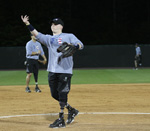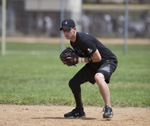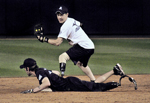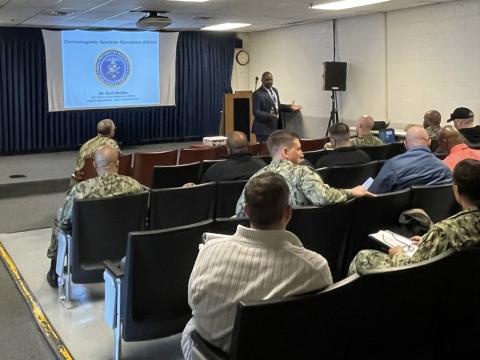Battlefield to Ball Field
This is one of several articles published in our Veterans Focus. To see all articles from the series, please visit www.afcea.org/signal/veteran.asp.
 |
Joshua Wege, a pitcher on the Wounded Warrior Amputee Softball Team (WWAST), lost both his legs to wounds suffered in Afghanistan. The team gives him a chance to play a sport he loves again while showing the nation that an amputation is no reason to sit on the sidelines. |
Break out the peanuts and Cracker Jacks; wounded warriors are back on the diamond to prove that capability, not disability, defines their play.
Love of the game has inspired athletes through the ages to overcome adversity and reach new heights. But their efforts pale in comparison to that of a group of veterans determined to continue playing despite life-altering amputations. Already proven to be men of commitment by their decisions to serve their country, the members of the Wounded Warrior Amputee Softball Team will settle for nothing less than competing at or near their pre-war levels, refusing any excuses or low expectations.
Made up of former troops who served in Iraq or Afghanistan, the team plays games around the country to provide support for veterans and to prove that amputation is no reason to stop pursuing one’s passions. David Van Sleet, the team’s manager and founder, says, “The first day that they got together, the first thing I saw was camaraderie. It started right away.” All the players are either Marines or soldiers, creating a natural competition and a shared bond of service. “They’re the best of friends,” Van Sleet explains.
He began his journey to the team by working with a sports camp for disabled veterans held at the University of Arizona. Originally designed for wheelchair athletes, Van Sleet suggested putting together an event for veterans with amputations. In March 2011, 20 amputees attended the camp to play softball. “We had the time of our lives,” Van Sleet says.
When choosing whom to invite, he says he looked for young, athletic men with experience playing baseball and softball who truly wanted to compete and do well, not just enjoy a winter vacation in the sunshine. To find the participants, he worked with organizations such as the Department of Veterans Affairs and the Wounded Warrior Project. When the camp ended, he selected 15 players to form the Wounded Warrior Amputee Softball Team (WWAST), which travels around the United States to play games. For more than 30 years, Van Sleet has played softball and been an amputee. He says his original goal was to encourage the players to start participating in the sport again and move them to some kind of normalcy.
Van Sleet and all his players are volunteers, using their free time to practice and travel to games. “Basically, it’s become a whole second job for me,” he says. His satisfaction comes from seeing his guys gel. “They were waiting for something like this,” Van Sleet explains. “They were waiting for a skilled sport to come out.” To fund their dreams, the team relies on donations to offset travel and other costs. Team members are dispersed across the country, so they practice on their own, often in local leagues; once a month, they practice together. Between 11 and 13 players go on each trip during which the team typically schedules two to three games over a weekend.
Despite the prosthetics sported by the team, they maintain a high level of competition. “We play only against able-bodied teams,” Van Sleet says. “We only want to play able-bodied teams.” He adds that the players demonstrate how, despite suffering injury and amputation and then receiving prosthetics, they mostly are back to their normal selves.
Though everyone on the team lost his limbs in the military, the message the team seeks to share has a wider scope. “It doesn’t matter [if they’re] veterans or regular people out in society,” Van Sleet explains. “We want to make sure if you go through extensive rehabilitation and your body lets you—get back on with your life and continue with the things you like to do whether it be sports or anything else.” Van Sleet says the WWAST has “a real connection” with law enforcement and fire departments, as well as the military, who form many of the teams they play. The players try to engage the local community, taking time to talk to spectators after games and answer questions.
Team members have a variety of amputations such as arms above and below the shoulder, hands, feet and legs, including amputations above the knee. “They’ve all expressed that this [WWAST] is probably one of the best things that ever happened to them,” Van Sleet says. “They always wondered if they could get back on a team that wanted them for their ability and not their disability.” Not only do these veterans play softball, but they also engage in a variety of other physical activities. One player missing his leg below the knee runs three to five miles a day. Yet another participates in triathlons and marathons.
The message of what can be done and done well is one that the team cannot overemphasize. “Please don’t feel sorry for these guys,” Van Sleet states. “They joined the service for a reason. If they weren’t hurt, almost everyone would probably still be in.” He wants people to realize that if they are severely injured, techniques exist to help them recover and engage in physical activities again whether through sports or different outlets. Already, Van Sleet says, the team has inspired others who have seen what the players can do and have determined to make the same strides themselves.
Joshua Wege, a pitcher on the WWAST, is one of the players who lost both his legs below the knee as a result of an injury in Afghanistan. Before enlisting, he played baseball through the high school level mainly as a shortstop and left fielder and was eager to return to the game after his recovery. “I have played ball all my life, and when the opportunity arose I jumped at the chance to play again, especially with a bunch of guys who serve as an inspiration to this country,” Wege says. “I love playing on this team. It is all I could ask for to even be able to play ball again, [especially] with a team of other amputees.”
 |
Matthew Kinsey plays shortstop on the WWAST. After losing his right foot following a blast in Afghanistan, he pushed himself to return to his former level of play. |
He encourages other wounded warriors to return to their former interests too. “My advice to fellow amputees would be to not be afraid to put themselves out [there] and not to be afraid to try something they did before the injury.”
Matthew Kinsey, the WWAST shortstop, lost his right foot while serving as an Army paratrooper in Afghanistan. Before his time in uniform, he played as a shortstop and catcher on his high school baseball team and as a quarterback on his high school football team. He now works as a high school football coach. Coaching football and playing in local softball leagues allowed him to return to athletics, Kinsey explains. When he heard about the amputee camp, he jumped at the chance to participate in it and then on the team. “I think when we went into camp, nobody knew what to expect,” Kinsey shares. “When you’re an amputee, not everybody thinks you can do things able bodies can.” He says that the other players at the camp were good athletes, and they all decided to see where they could go with the team. “The guys have worked extremely hard to get to the level that we’re at,” he states.
Kinsey comes from the town of Rockville, Indiana, and says people still ask him if he can run or “do this or that.” The team helps him prove that amputees still can take part in former activities. Before joining the team, he already had confidence in his ability, but he wondered if he could return to the level at which he wanted to play; if not, he would stop competing. The 26-year-old player explains that, “This was my only chance to become an athlete again.”
Returning to his pre-injury skill set was his biggest concern, but he says he is happy with his play. “Laterally, I may be a step slower, but you make up for that with knowledge, and I’m very pleased with the way things are going,” Kinsey states, adding that he still dives for balls and plays as hard as he can each time he steps onto the field. In addition to practicing once a month with the WWAST, he works out three to four days a week and participates in local softball games when possible.
Kinsey enjoys playing on the WWAST because of his teammates and his competitive nature. “It brings back a lot of good memories,” Kinsey explains. “It brings out a side of myself that I had not seen in a while.” Kinsey says the team sends a good message to the nation that amputees can play at levels on par with other athletes. “The thing is, you get knocked down, everyone does, but the group of guys we have is very resilient,” he states. “Things get bad, but you can come out on top with a lot of hard work.”
He encourages anyone with an amputation to return to athletics. “You’re your own worst enemy,” Kinsey says. “When I started rehab, I hit it as hard as I could. I saw guys who were doing something, and I wanted to do it better than them. I won’t knock anybody who doesn’t want to, but if you want to get back into sports, there’s no reason why you shouldn’t.”
Competing also helps players set and achieve goals. Kinsey says the players drive themselves and each other, offering constructive criticism and encouraging the competitive fire. He is the most recently injured member of the team, suffering his wounds about a year ago. He explains that he is a rare case because he “never had a real problem with the recovery.” Most of the players are fully recovered now, he says, and they are looking for the next task to accomplish.
 |
Tim Horton tags out Nick Clark as he slides into second base during a game in which half the WWAST played the other half. Members of the team all have at least one prosthetic device because of injuries they incurred during military service. |
Attendees of AFCEA West 2012 in San Diego in January will have the chance to see the WWAST in action. They will compete against a team put together by the association and are sponsored by Booz Allen Hamilton. Providing support to wounded warriors, and the entire military community, is a priority for AFCEA and many of its corporate members.
Booz Allen Senior Vice President Natalie Givans says her company “is proud to sponsor the WWAST, which draws attention to the sacrifices made by men and women in the military and celebrates their ability to recover and thrive. As a firm with many strong ties to our nation’s military—they are our clients, co-workers, business partners, friends and family members—Booz Allen is committed to supporting groups like the WWAST, which honor our military and their families and provide them with the means to achieve their dreams in all facets of their lives.”
Play Ball!
RESOURCE
Wounded Warrior Amputee Softball Team: www.woundedwarrioramputeesoftballteam.org
The Wounded Warrior Amputee Softball team will be featured at a special WEST 2012 event at PETCO Park, playing against AFCEA and WEST conference VIPs. The game will be part of a networking event on the evening of Tuesday, Jan. 24, 2012. For more information, see "Take Me Out to the Ballgame."




Comments